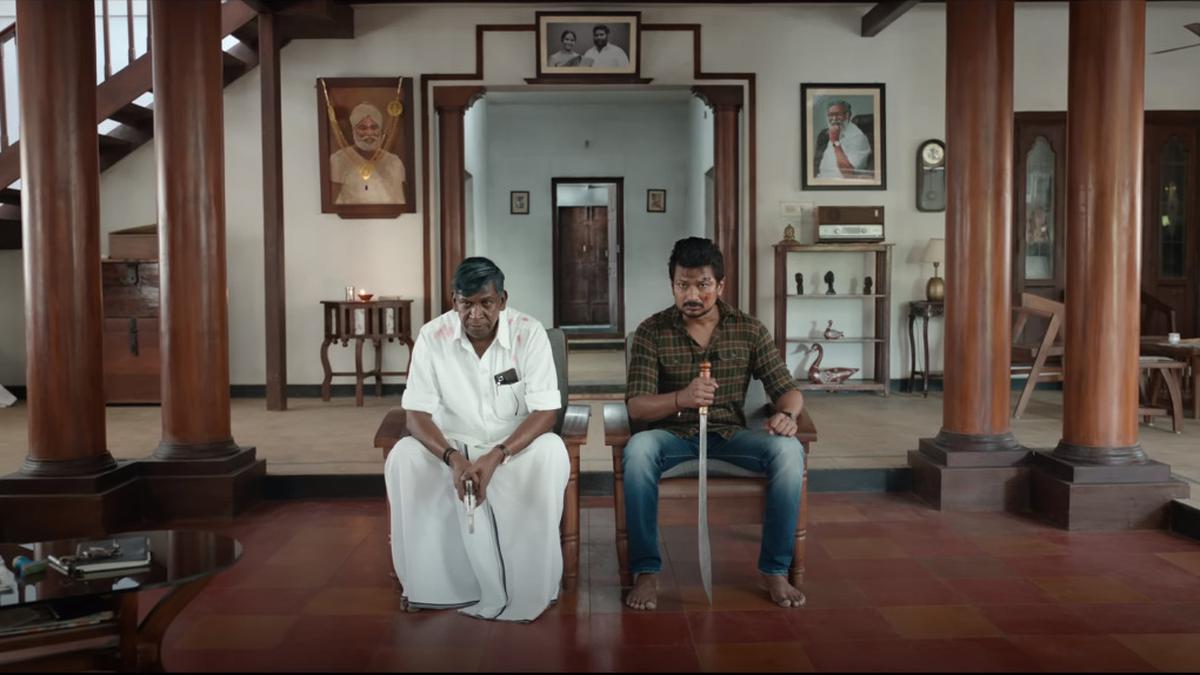
Maamannan: a mirror to the ideological bankruptcy of Dravidian politics Premium
The Hindu
Maamannan, a recent movie, critically examines the position of Dalits within Dravidian parties. It highlights the everyday nature of caste politics, the helplessness of Dalits, and the continued hegemonic caste practices. The movie also shows how Dalits can overcome fear and indignity by upholding self-respect and learning martial arts. It raises hope that acknowledgement of caste-based discrimination within Dravidian politics will lead to more interventions for equality and justice.
There has always been a long-lasting conjugal relationship between the Tamil celluloid industry and Dravidian politics. Cinema has been the umbilical cord of Dravidian parties for mobilisation and political propaganda. Many leaders and Chief Ministers have cultivated voting citizens based on their images from the celluloid world. As Tamil film historian Thodore Baskaran said, films are an essential part of mass campaigns by political parties.
The focus of Dravidian parties in its initial days were on non-Brahmin movements, self-respect, democracy and equality. Even though Tamil films dealt with many similar topics related to social reforms, the caste conflict between non-Brahmins and Dalits was yet to be fully explored in depth. The recent movie Maamannan was one such significant attempt in critically evaluating the position of Dalits within dominant Dravidian political parties.
Mari Selvaraj’s third movie Maamannan has received many positive reviews and generated a multi-layered discussion on intra-party dialectics on casteism. The protagonists of the film — namely Vadivelu as Maamanan, Udhayanidhi Stalin as Athiveeran, Keerti Suresh as Leela and Fahadh Fazil as Rathnavelu — portray the objective condition of casteism within Dravidian parties in Tamil Nadu. It lays bare the weakness of Dravidian parties in formulating a path towards annihilation of caste or at the very least eradicating the practice of untouchability among their leaders and cadres through ideological orientation.
The movie has generated debate and discussion among the public as well as in political circles. It unravels the hidden truth about Dravidian party leaders’ treatment towards their colleagues who belong to the Dalit community. Though there have been narratives about this reality in a few Tamil literary fictions, particularly by writers such as Imayam, Perumal Murugan, Sivagami and others, this movie has opened up such discussions among the public. This is, indeed, the major success of the movie.
Some have identified the movie with the experience of former Assembly Speaker P. Dhanapal of the All India Anna Dravida Munnetra Kazhagam (AIADMK) party, while in some others the movie invoked memories of how Thol. Thirumavalavan, Member of Parliament and President of the Viduthalai Chiruthaigal Katchi (VCK), was restricted from entering certain villages in the Chidambaram constituency from where he contested the Lok Sabha elections. Furthermore, some are even speculating whether the main caste Hindu character in the movie is a senior leader of the AIADMK.
Certain situations in the movie are poignantly depicted through dialogue such as the helplessness of Maamannan with respect to his caste Hindu mentor Salem Sundaram. Later, the heated argument between Rathnavelu and Athiveeran about sitting at par with each other turns into an assertion of self-respect in the face of continued hegemonic caste practices. Rathnavelu tells Athiveeran that the reason why he offered him a seat to sit along with him is because of his politics (arasiyal) while the same offer is not extended to Athiveeran’s father due to his own dominant caste Hindu identity (adayalam). It is rare for Tamil cinema to show so daringly such a sequence which showcases the everyday nature of caste politics. Similarly, the movie holds conversations about reserved constituencies, Dalit political representatives and how and why caste Hindu leaders invest and groom Dalit leaders to control Dalit self-assertion. The director and the actors deserve our appreciation for insistently depicting naked caste politics in commercial cinema.
The film examines how for the sake of ‘caste pride’, casteist Hindu leaders will go to any extent through violence or even murder. These instances remind the audience of the protracted on-going caste killings in the State. Additionally, Mari Selvaraj captures the politics of name calling in a casteist society. He exposes how fellow caste Hindu leaders address Dalit leader Maamannan as Maanu meaning soil, (in a derogatory manner) by cloaking it under the pretence of affection. Only his son, Athiveeran, calls him by his full name.











